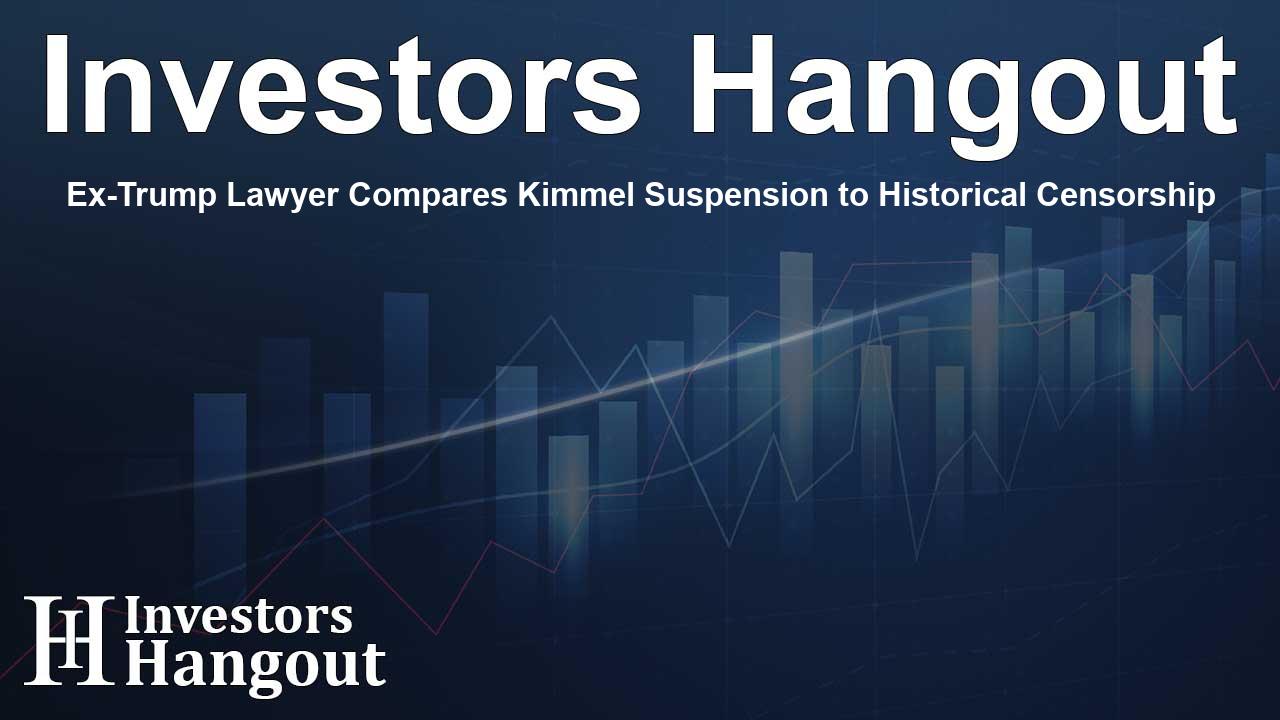Ex-Trump Lawyer Compares Kimmel Suspension to Historical Censorship

Ty Cobb's Controversial Remarks on Media Censorship
Ty Cobb, a notable former attorney for the White House, has made headlines for comparing the recent suspension of comedian Jimmy Kimmel to actions taken in historical contexts of media suppression. Such comparisons invite deep reflection on the current landscape of free speech and governmental influence over the media.
Kimmel's Suspension and its Implications
The indefinite suspension of "Jimmy Kimmel Live!" has stirred a mix of reactions, particularly from political figures like Trump who have commented on the limits of media criticism. This incident showcases how the climate of media censorship can stir concerns about freedom of expression.
The Comparison to Historical Events
Cobb drew a connection between Kimmel's situation and similar historical acts of censorship, particularly referencing the tactics used by the Nazis in the late 1930s. For instance, when entertainers were removed from the airwaves due to their political stances, it signified a troubling precedent of governmental control over media narratives.
Contextualizing Today's Media Landscape
In today's era, where various political figures are scrutinized heavily, Cobb's remarks urge us to consider the implications of such pressures on television and media production. Trump's assertion that criticism could transcend into illegal territory complicates the understanding of free speech in a democratic society.
The Broader Discussion on Free Speech
Kimmel's suspension further fuels an ongoing debate about how far government influence can extend into entertainment and news. Many advocates for free speech worry about the chilling effect that such suspensions could cause, dissuading comedians and public figures from expressing their opinions.
Understanding the Historical Parallels
The historical context provided by Cobb serves as a stark reminder of past regimes that employed similar tactics for suppressing dissenting voices. Comparisons to the likes of Vladimir Putin's actions in Russia amplify the discourse around media control and the extent to which governments may go to suppress critical voices.
The alarming similarity lies in how both regimes managed to craft narratives that favored their political agendas while silencing opponents. Cobb's warnings echo the need for vigilance among citizens regarding the interactions between government power and media integrity.
Media Censorship's Effects on Society
The current climate encourages ongoing scrutiny of media content. With the suspension of Kimmel serving as a fresh focal point, public discourse examines how censorship, whether governmental or corporate, can ultimately shape cultural narratives.
Final Thoughts on Free Expression
Cobb's comments challenge audiences to reflect on their societal values regarding freedom of expression. The crossover between entertainment and political pressure brings to light an essential duty to uphold the integrity of free speech, ensuring that a variety of voices can be heard, regardless of political affiliation.
Frequently Asked Questions
What was Ty Cobb's main argument regarding Jimmy Kimmel's suspension?
Ty Cobb argues that Kimmel's suspension parallels historical media censorship tactics employed by authoritarian regimes, showcasing the troubling potential for government influence over media.
How has Trump reacted to the suspension of Jimmy Kimmel?
Trump has expressed approval of Kimmel's suspension, suggesting that excessive criticism of him in media qualifies as an infringement on free speech.
What historical examples did Cobb reference to underscore his point?
Cobb referenced the Nazis' actions in the late 1930s, where entertainers were banned for their opposition to National Socialism, highlighting past government-led censorship.
Why is media censorship a concern in today's society?
Media censorship is concerning as it threatens freedom of expression and could lead to a homogenized narrative that undermines diverse viewpoints in society.
What implications does this have for the future of free speech?
Cobb's commentary suggests that increased government scrutiny of media may create a chilling effect, deterring voices from expressing dissent and potentially damaging democratic principles.
About The Author
Contact Henry Turner privately here. Or send an email with ATTN: Henry Turner as the subject to contact@investorshangout.com.
About Investors Hangout
Investors Hangout is a leading online stock forum for financial discussion and learning, offering a wide range of free tools and resources. It draws in traders of all levels, who exchange market knowledge, investigate trading tactics, and keep an eye on industry developments in real time. Featuring financial articles, stock message boards, quotes, charts, company profiles, and live news updates. Through cooperative learning and a wealth of informational resources, it helps users from novices creating their first portfolios to experts honing their techniques. Join Investors Hangout today: https://investorshangout.com/
The content of this article is based on factual, publicly available information and does not represent legal, financial, or investment advice. Investors Hangout does not offer financial advice, and the author is not a licensed financial advisor. Consult a qualified advisor before making any financial or investment decisions based on this article. This article should not be considered advice to purchase, sell, or hold any securities or other investments. If any of the material provided here is inaccurate, please contact us for corrections.
